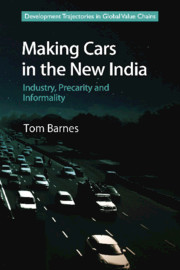Book contents
- Frontmatter
- Dedication
- Contents
- Tables, Figures and Maps
- Acknowledgments
- Abbreviations
- 1 The Limits of Industrialisation
- 2 The Auto Industry in India Today
- 3 Auto Manufacturing and the Evolution of Industrial Policy
- 4 The Transformation of Labour Relations
- 5 Auto Workers in India's National Capital Region
- 6 Work and Life at the Bottom of the Auto Supply Chain
- 7 Driving Down the ‘Low Road’?
- Appendix
- Bibliography
- Index
3 - Auto Manufacturing and the Evolution of Industrial Policy
Published online by Cambridge University Press: 23 October 2018
- Frontmatter
- Dedication
- Contents
- Tables, Figures and Maps
- Acknowledgments
- Abbreviations
- 1 The Limits of Industrialisation
- 2 The Auto Industry in India Today
- 3 Auto Manufacturing and the Evolution of Industrial Policy
- 4 The Transformation of Labour Relations
- 5 Auto Workers in India's National Capital Region
- 6 Work and Life at the Bottom of the Auto Supply Chain
- 7 Driving Down the ‘Low Road’?
- Appendix
- Bibliography
- Index
Summary
State institutions have played a critical role in the modernisation of automotive manufacturing in India and the emergence of new regional industrial zones. They have also played an important role in the evolution of conflict in the auto industry. The previous chapter showed how Indian auto manufacturing has been transformed by global production networks since the 1980s. This chapter turns to the role of the state in this process and its gradual impact on work organisation, labour standards, and employment relations.
At a regional level, key State governments in India have played a strong and consistent role in attracting, encouraging and shaping automotive-based investment from foreign and domestic lead firms known as Original Equipment Manufacturers (OEMs). This chapter shows how successive governments in the State of Haryana – a 45,000 square km territory overlapping with the National Capital Region (NCR) – played a leading role in this process, working with national governments to facilitate the rise of global production networks orchestrated by Japanese OEMs.
This chapter shows how, at a national level, this process of regional development was shaped through two phases: first, a period of ‘restricted openness’ from 1982 until 1991 and second, a longer period of ‘emergent neo-liberalism’ after 1991. The first period represents a bridgehead between India's postcolonial planning tradition, based on Import Substitution Industrialisation (ISI), to an era of neo-liberal policy-making after 1991.
In this first period, industrial policy was based upon gradual measures to extract the benefits from foreign investment, technology and ‘lean manufacturing’ while maintaining a series of restrictions on foreign capital via auto market segmentation, industrial licensing, joint ventures with Public Sector Units (PSUs) and private domestic, industrial conglomerates and targets for locally-manufactured components in global production networks. Despite these restrictions, the sheltering of domestic auto markets enabled pioneering foreign OEMs to impose much of their preferred models of work organisation, labour standards and employment relations via lean manufacturing.
In the second phase, the gradual liberalisation of financial markets, trade rules and restrictions on domestic and foreign investment from 1991 until the 2000s dramatically re-shaped auto market segmentation and competition. This had major implications for labour standards and employment relations in the operations of OEMs, their strategic partner firms, and key independent suppliers.
- Type
- Chapter
- Information
- Making Cars in the New IndiaIndustry, Precarity and Informality, pp. 77 - 104Publisher: Cambridge University PressPrint publication year: 2018



